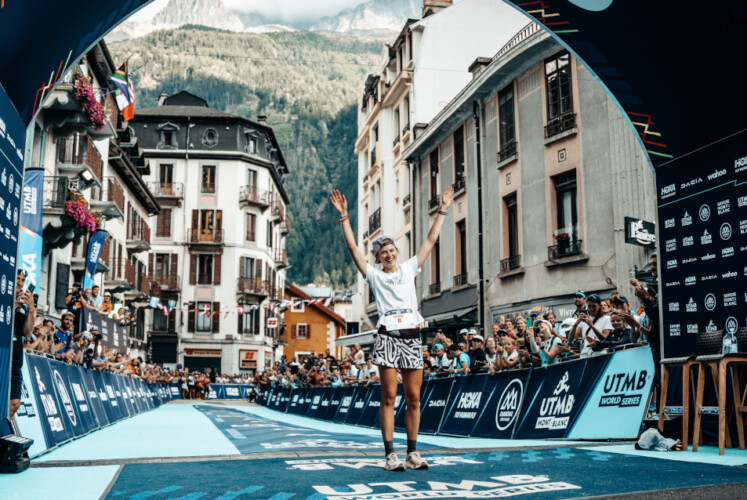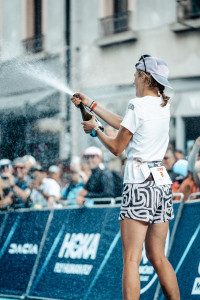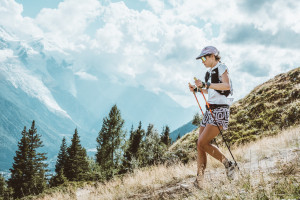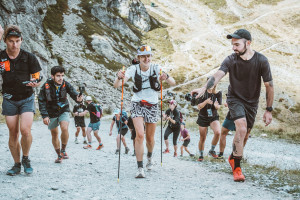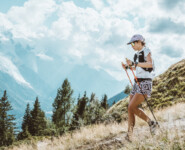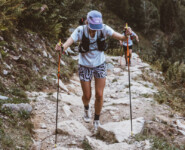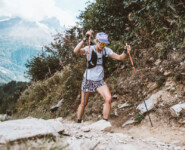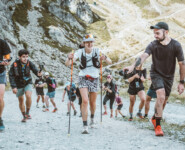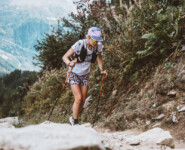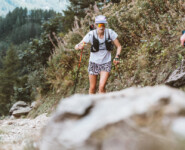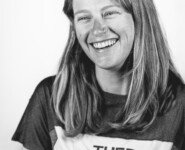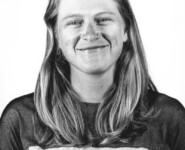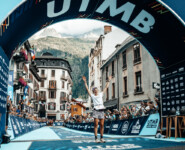For 100km, she dominates UTMB 2022. Until her stomach kicks in. She fights, but gets into second place, 10-minutes back. At kilometer 142, she rises again – and after 171 kilometers, she crosses the finish line with a 75-minute lead. A racing thriller as only the great events write it. In the leading role: the American Katie Schide.
The North Face athlete knew exactly what she was getting into at the Ultra-Trail du Mont-Blanc with its 171 kilometers and 10,000 meters of altitude in the queen discipline. She finished as the 8th woman in 2021, and as high as 6th in 2019. In 2018, she finished 2nd in the CCC, the Courmayeur / Champex / Chamonix Track with 101 kilometers and over 6,000 meters of elevation gain.
Now, about 2 months after her win, Katie is enjoying a rest. Of course, she still has a training plan, but that may be slacked sometimes – do what you feel like. She seems balanced, reflective, and grateful. Grateful not only for her sporting successes in 2022, where, in addition to the UTMB, she also placed first in the Val d’Aran by UTMB (100 kilometers) and first in the Maxi Race Marathon (45 km). Almost on the side, she also finished her PhD at ETH Zurich in geology.
„At a university like ETH Zurich, it’s not normal to be able to do a PhD alongside another main job. I was lucky that my passion for running was seen and supported, so the PhD became feasible anyway. Now, though, I’m happy that I don’t have to commute anymore, don’t have to tie in lab time, and can focus completely on the sport.“
From UTMB to Western State – trail running in the USA and Europe
And there is still a lot to come. Autumn is just arriving in her adopted country of France, and winter will soon follow. Then she might be on the road again for the US National Skimo Team. Nominations are still pending. Next year she will also compete in the legendary Western States Endurance Run (161 kilometers) in the USA. Katie has lived in France for years, but she grew up on the American East Coast. So, a home race? Not at all. „The Western States takes place several thousand kilometers from where I grew up. It would take several days to get there by car. You sometimes forget how big this country is.“
As big as the country is, some things are quite similar from the East Coast to the West Coast – which is especially noticeable when look at from another continent. „Compared to Europe, trail running in the U.S. is almost synonymous with ultra distances. Here in Europe, you first have to explain what kind of distances you’re running, whether they’re mountain runs, and so on. In addition, the trail running scene in the USA is perhaps a bit more community-oriented. Community runs end more often with a joint coffee or beer, and local races aren’t always as competitive.“ Looking for an explanation, a general American mentality could be assumed. But is that enough? „Americans are often quite loud and communicative. But you can’t generalize that. I for example would describe myself more as an introvert. But maybe it’s because, in contrast to Europe, there are many larger cities in the U.S. with mountains nearby. So, it stands to reason that people would take off for the mountains together. You don’t find that combination of big city and mountains that often in Europe.“
Take it easy
When comparing running communities, we are in the realm of assumptions and hypotheses. Katie is careful with her statements, deliberating, listening carefully to questions, comments, and observations. She seems to enjoy building hypotheses, the passion for science is easily visible. Even more clearly so when it comes to the topic of training. „I read a lot of literature about it, listen to podcasts and talk to others. I love to nerd into these topics!“
All the more surprising is her observation of what trail runners do wrong far too often: „People often train too much or too intensely. A training run shouldn’t exhaust you so much that the way to the car afterwards becomes torture.“ She laughs at the unexpectedness of this remark – coming from a pro athlete who just won the UTMB. Then she tops it: „Don’t over-complicate things. My workouts are all on Strava – I’m very transparent about that. Most people would be surprised how unspectacular the individual trainings often are. I’m also often asked if I run according to heart rate or something similar. But I run very much according to my feelings and listen carefully to myself.“
Misplaced myth of suffering
She also listened carefully to herself at the UTMB, when she was overtaken by the Canadian Marianne Hogan after a good 100 kilometers at Arnouvaz. Katie had problems with her stomach. The coke she had earlier messed up quite a bit, her stomach didn’t keep anything in, Katie had to slow down her pace considerably, and think carefully about what was still possible now. She decided to fight, was able to soothe her stomach with a cheese sandwich and finally crossed the finish line as the first woman.
We love stories like this. It’s the classic heroine’s journey with a happy ending. But what do stories like this and our enthusiasm for them mean when you look at them from a distance? Is our health radar broken? Shouldn’t we be saying: Katie, stop, don’t mess yourself up? „It wasn’t anything serious, thankfully. I know myself and my body very well and can assess it very well by now,“ she puts it into perspective.
So, what about that myth of suffering so many of us share in trail running? „I personally can’t relate to that at all. If someone falls during a race and then continues with a broken arm, that doesn’t inspire me at all. If I notice that something is really wrong, I have no problem stopping a race.“ Still, for how long is something okay and at what point does it become reckless? „Running 100 miles through the mountains is generally not healthy. There’s nothing to argue about that either. The underlying training is a different matter. After thousands of hours of training, I just know myself and my body very well. I can get up in the morning and notice that some little thing is not 100% ok. Then I adjust the training accordingly. I couldn’t do that nearly as well six years ago.“
No mountains are no solution either
What can ambitious trail runners or those just starting take away for their training if they want to stay healthy? Don’t train too hard, listen very honestly to yourself and your body, and enjoy what you do. After an eventful and extremely successful 2022, for the North Face athlete that means skimo training for now. „I just love the mountains and the skimo training has paid off this season. I probably won’t change much about that.“
Eventually, there’s one question that even bring the scientist in her to a standstill: Does she have training tips for people who don’t live in the mountains and therefore don’t have the option of skiing? Laughing, she dodges the topic: „I wouldn’t live in an area like that, so that’s not really a question in my life. But if nothing else is possible, indoor cycling or similar can be a useful addition to training.“
Let’s hope that as few trail runners as possible have to resort to this.
(This interview has been translated from German to English.)
